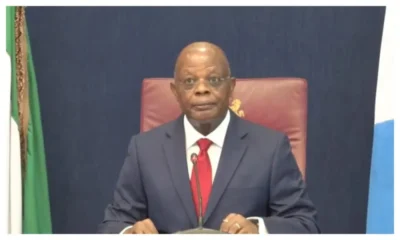Politics
US election: Middle East conflict becomes key issue for Harris and Trump
Published
6 months agoon
By
Ekwutos BlogWith just two weeks until election day, the ongoing crisis in the Middle East has become a focal point in the US presidential race.
Vice President Kamala Harris and former President Donald Trump are each attempting to address the conflict’s complexities while fighting for crucial votes in battleground states like Michigan and Pennsylvania, which have large Arab American and Jewish populations.
Harris has been navigating a challenging line, expressing strong support for Israel while also condemning civilian casualties in Gaza and Lebanon.
This balancing act has drawn mixed reactions, including criticism from some who misinterpreted her remarks during a recent exchange with a pro-Palestinian protestor as agreeing with claims of Israeli “genocide.”
Harris’ campaign quickly clarified that her comments were focused on the broader humanitarian condition in Gaza.
The dynamics shifted a day earlier when Harris stated that the “first and most tragic story” of the conflict was the 7 October Hamas attack that resulted in the deaths of about 1,200 Israelis.
This statement upset those who felt she was not adequately addressing the deaths of over 41,000 Palestinians in Gaza, leading to further criticism of her stance.
Trump, on the other hand, has taken a more assertive approach, claiming the conflict would not have occurred under his leadership and promising an end to it if elected.
In recent interviews with Middle Eastern TV outlets and posts on his social media platform Truth Social, Trump claimed that a Harris administration would escalate the conflict, even suggesting the risk of World War III.
“If Kamala gets four more years, the Middle East will spend the next four decades going up in flames, and your kids will be going off to war, maybe even a World War III, something that will never happen with President Donald J Trump in charge,” Trump posted.
Can Harris and Trump navigate the Middle East crisis?
As Harris tries to align her messaging with President Joe Biden’s policies while striking a more emphatic tone, some in the Democratic Party express frustration over Trump’s unpredictable but bold foreign policy statements, which have gathered attention without much scrutiny.
Analysts note this contrast as a potential challenge for Harris in the final days of the campaign.
An AP-NORC poll indicates neither candidate holds a significant advantage on Middle East policy, with voters split on who would handle the situation better.
However, Harris faces some discontent within her party. Only two-thirds of Democrats say she would be the better candidate to address the conflict, while 8 in 10 Republicans back Trump on the issue.
In Michigan, home to the largest Arab American community in the US, the war’s impact is deeply personal. The community has called for a ceasefire and criticised the Biden administration for its stance on the conflict.
While Harris initially offered hope for change, many feel her policies have not diverged enough from Biden’s.
Despite both parties largely supporting Israel, much of the frustration and criticism has been directed towards Biden.
When Harris launched her campaign, Arab American leaders were initially hopeful. However, that hope quickly faded as the community felt she had not distanced her policies enough from Biden’s.
Meanwhile, ads funded by Future Coalition PAC, a group backed by Elon Musk, are targeting Arab American communities in Michigan and Jewish voters in Pennsylvania, each emphasising different aspects of Harris’ stance on Israel.
As election day nears, the Middle East crisis remains a critical issue both for the candidates’ messaging and the race’s outcome.
You may like


Nigerian troops destroy 22 illegal refining sites, arrest 49 oil thieves


Rivers Women Stage ‘Bring Back Our Fubara’ Protest In Port Harcourt


Nigerian PhD student arrested over alleged $1m fraud, romance scam


500K deposit: Man who lost his pregnant wife responds after Reuben Abati, blasted him.


Kano deputy gov reports back after peace-building mission in Edo


Despite criticism, Ibas swears in sole administrators for Rivers LGAs
Politics
Kano deputy gov reports back after peace-building mission in Edo
Published
10 hours agoon
April 11, 2025By
Ekwutos Blog
The Deputy Governor of Kano State, Aminu Abdussalam Gwarzo, has reassured northerners living in Edo State about their safety, following the recent violence that led to the deaths of several Kano indigenes.
Ekwutosblog recalls that Gwarzo led a high-powered delegation to the South-South state. The delegation included the Emir of Rano, Ambassador Muhammad Isa Umar, four commissioners, the Chairman of Bunkure Local Government (the area most affected by the incident), and the representative of the Edo community in Kano.
Speaking to journalists in Kano, Gwarzo revealed that the visit followed an earlier condolence mission by Governor Monday Okpebholo to the Torankawa Community in Bunkure Local Government Area of Kano, where seven of the victims hailed from.
Gwarzo noted that the delegation visited the scene of the incident in Uromi, Edo State, where they were warmly received by both political and traditional leaders.
He described the reception as overwhelming, with a massive crowd, largely consisting of northerners, showing solidarity and appreciation.
“We met with the king of Uromi Kingdom and his senior chiefs. The Edo State governor personally accompanied us to the scene. It was a long journey nearly two hours from Benin but the turnout was incredible,” he said.
He commended the Edo State leadership for its proactive actions, including the disbandment of the vigilante group allegedly involved in the killings, the arrest of 14 suspects, and ongoing efforts by security agencies to apprehend those still at large.
“The Commissioner of Police in Edo State was transferred due to the incident, which shows the seriousness with which the state government is handling the situation,” the deputy governor stated.
He further disclosed that Kano had compiled a comprehensive report, documenting the victims and the extent of losses suffered, including properties destroyed.
He said the report has been formally submitted to Governor Okpebholo, who promised compensation for the victims and their families.
Gwarzo emphasized that justice remains the core demand from the Kano State Government and reiterated the constitutional right of every Nigerian to live and work peacefully in any part of the country.
“Nigeria belongs to all of us. The constitution guarantees every citizen the right to reside and earn a living anywhere in the country.”
“The governor of Edo has assured us that those responsible will be brought to book and that compensation will be provided. He made it clear that there is no animosity toward northerners in Edo. From what we witnessed, I can confidently say our people are very safe there,” he said.
He also confirmed that 26 individuals survived the attack, primarily from five local government areas in Kano.
Politics
Atiku, El-Rufai, Tambuwal visit Buhari in Kaduna
Published
12 hours agoon
April 11, 2025By
Ekwutos Blog
Former Vice President and 2023 PDP presidential candidate, Atiku Abubakar, has visited former President Muhammadu Buhari at his residence in Kaduna.
The visit, which also included former governors Aminu Waziri Tambuwal (Sokoto) and Nasir El-Rufa’i (Kaduna), was captured in a video sighted on the Facebook page of Atiku Abubakar.
Although the specific purpose of the visit was not disclosed, Atiku described it as a “post-Sallah visit.”
In the post, Atiku wrote, “As the Waziri Adamawa, I was obligated to be in Adamawa during the Sallah celebrations. I held forth for the Lamido Fombina (Adamawa) in some of the activities of the Sallah celebrations. Today, I had the opportunity to pay a post-Sallah visit to His Excellency, Muhammadu Buhari, President of the Federal Republic of Nigeria, 2015-2023. It was a wonderful time with him. As usual, he cracked me up (to the extent that my ribs were hurting) with his peculiar humour. -AA”
The visit comes after governors from the All Progressives Congress (APC) paid a similar visit to Buhari in Kaduna last week, amid growing speculation about political realignments and possible coalitions ahead of the 2027 elections.
Politics
Rivers govt debunks civil service recruitment announcement
Published
12 hours agoon
April 11, 2025By
Ekwutos Blog
Rivers State Government has refuted a widely circulated social media announcement alleging that the state’s Sole Administrator, retired Vice Admiral Ibok-Ete Ekwe Ibas, approved the recruitment of 10,000 “graduates and non-graduates” into the Rivers State civil service.
On Thursday, social media platform “Facebook”, was flooded with the purported government notice, which falsely claimed that the recruitment exercise had been sanctioned.
The statement was reported to have been signed by the Secretary to the State Government, Professor Ibibia Lucky Worika.
However, in a statement issued by Mrs. Inyingi S. I. Brown, Acting Head of the Rivers State Civil Service, the government described the information as entirely untrue and urged the public to disregard it.
The statement also clarified that any official communication on civil service recruitment would come from the Rivers State Civil Service Commission at the appropriate time.
The statement read, “The Office of the Administrator of Rivers State wishes to disclaim a purported Special Government Announcement spreading round on social media and other platforms stating that His Excellency, The Administrator of Rivers State, Vice Admiral (Rtd) Ibok-Ete Ekwe Ibas CFR, has approved the recruitment of 10,000 qualified graduates and non graduates into the Rivers State civil service and that the recruitment portal shall be opened for application midnight of Sunday 13/04/2025.
“The statement is claimed to have been signed by the Secretary to the State Government, Professor Ibibia Lucky Worika.
“We wish to categorically inform the people of Rivers State and the general public that this is false and ask that this fake announcement be ignored.
“Appropriate information will be released by the Rivers State Civil Service Commission in due time.”

Nigerian troops destroy 22 illegal refining sites, arrest 49 oil thieves

Rivers Women Stage ‘Bring Back Our Fubara’ Protest In Port Harcourt

Nigerian PhD student arrested over alleged $1m fraud, romance scam
Trending

 Trending6 months ago
Trending6 months agoNYA demands release of ‘abducted’ Imo chairman, preaches good governance
- Business6 months ago
US court acquits Air Peace boss, slams Mayfield $4000 fine

 Politics6 months ago
Politics6 months agoMexico’s new president causes concern just weeks before the US elections
- Entertainment6 months ago
Bobrisky transferred from Immigration to FCID, spends night behind bars
- Entertainment6 months ago
Bobrisky falls ill in police custody, rushed to hospital

 Politics6 months ago
Politics6 months agoRussia bans imports of agro-products from Kazakhstan after refusal to join BRICS

 Politics6 months ago
Politics6 months agoPutin invites 20 world leaders
- Politics1 year ago
Nigerian Senate passes Bill seeking the establishment of the South East Development Commission.

